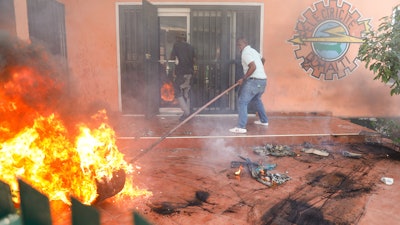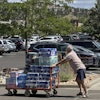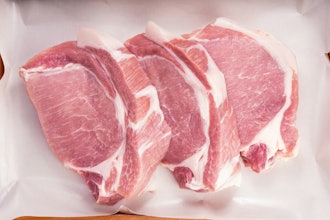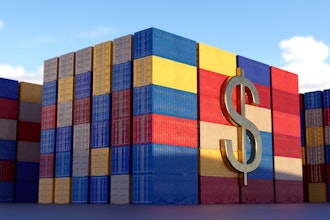
PORT-AU-PRINCE, Haiti (AP) — Rotting fruit, withered vegetables, empty water jugs and spent gas canisters now stock the stores and stands that serve Haiti's poor — a consequence of the unrelenting gang attacks that have paralyzed the country for more than a week and left it with dwindling supplies of basic goods.
The terrifying violence as anti-government gangs battle police in the streets has crippled the fragile economy and made it extremely difficult for many of the country's most vulnerable to feed themselves.
The main port in the capital, Port-au-Prince, closed down, stranding scores of containers full of food and medical supplies at a time when U.N. officials say half the country's more than 11 million inhabitants don't have enough to eat, and 1.4 million are starving.
Grocery stores in upscale parts of the capital remain stocked, but their goods are out of reach to most in a country where most people earn less than $2 a day.
"People are desperate for water," said Jean Gérald, who was hawking blackened tomatoes and shriveled scallions on a recent day, confident they would sell quickly because food is so scarce in parts of Port-au-Prince. "Because of gang violence, people will go hungry."
Next to him were rows of empty jugs he hadn't been able to refill because the violence had forced one of the country's main bottled water operators to shut down.
Gérald noted that he was running out of things to sell because the depot where he usually buys rice, oil, beans, powdered milk and bread had been set on fire and its owner had been kidnapped.
As he spoke, gunfire echoed in the distance.
Scores of people have been killed and more than 15,000 have been forced from their homes since coordinated gang attacks began on Feb. 29 while Prime Minister Ariel Henry was in Kenya to push for the U.N.-backed deployment of a police force from the East African country to fight gangs in Haiti. A Kenyan court, however, ruled in January that such a deployment would be unconstitutional.
As the gangs rampaged through Port-au-Prince, freeing more than 4,000 inmates from the country's two biggest prisons, attacking its main airport and setting police stations on fire, Haiti's least powerful have suffered the most.
"It's a pretty bad situation," said Mike Ballard, intelligence director at Global Guardian, a Virginia-based international security company. "The gangs are trying to fill a power vacuum."
Schools, banks and most government agencies remain closed. Gas stations have also shuttered, and the few who can afford to pay $9 a gallon — more than twice the usual rate — have flocked to the black market.
Street vendors are slowly losing their livelihoods and wonder how they'll feed their families.
Michel Jean, 45, sat on Thursday next to the makeshift metal shack where he normally sells rice, beans, milk and toilet paper.
"If you take a look inside, there's nothing," he said, gesturing to a few cans of sardines. "I don't know how long this is going to last. I'm hoping this crisis is over, and that people can go back to their regular life."
That seems unlikely for now.
Henry, who is facing calls to resign or form a transitional council, remains unable to return home. He arrived in Puerto Rico on Tuesday after he was unable to land in the Dominican Republic, which borders Haiti. The Dominican government said he lacked a required flight plan as they closed their country's airspace with Haiti.
Meanwhile, Haitian officials extended a state of emergency and nightly curfew on Thursday as gangs continued to attack key state institutions.
"They are saying essentially that they are prepared to take over the government," said Robert Fatton, a Haitian politics experts at the University of Virginia, referring to the gangs. "I think we should take them fairly seriously."
Valdo Cene, 38, said he worries that elderly people are dying in their homes, with some people unable to venture out for food and water because gangs control their neighborhoods.
Cene used to sell propane, which many use for cooking. But he has been unable to resupply because gangs are blocking the roads and seizing control of more territory, including parts of Canaan, a community north Port-au-Prince.
"The whole area is suffering," he said. "They are not getting any water. They are not getting any propane."
Cene said he and his family are living off their remaining rice, beans, sardines and plantains, along with a handful of yams and carrots. He wonders when he'll be able to make a living again.
As more and more people are left unemployed, street vendors are selling smaller amounts of essential goods.
On a recent afternoon, Gérald poured less than a cupful of cooking oil into an old water bottle and handed it to a young boy. It was all the boy's family could afford, and not enough for Gérald to continue making a living.
"If the foreign force comes in, it will give a break to the little people like me to have a life and continue fighting for a better future," he said.






















